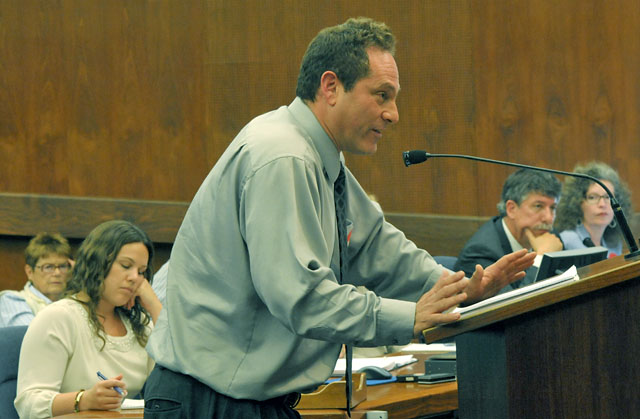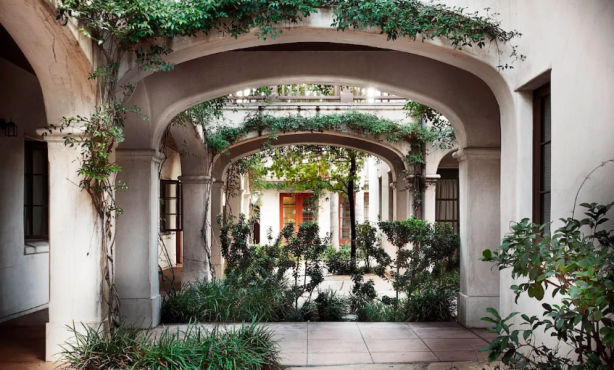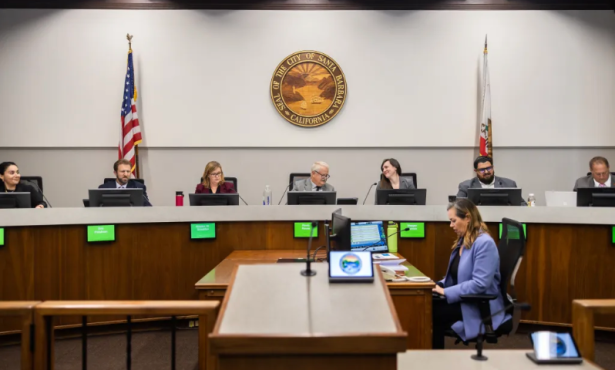‘Party Houses’ Still Irking Neighbors
Permitting Loophole Reaches Supervisors Who Kick it Down the Road

When Kim Kardashian got married at a Montecito home in August 2011, it put a very public face on an issue that some residents in More Mesa and Santa Ynez had been dealing with for some time — a wedding held at a private residence, rented just for that occasion.
Montecito residents felt the sting from the chaos surrounding that wedding affair, and they complained — the Sheriff’s Department received 22 calls for service related to the Kardashian bash. Of course, helicopters and paparazzi added to the inconvenience for neighbors, two impacts not usually felt by people who live near other venues around the county.
Two locations — specifically a home in the More Mesa Shores neighborhood, and the Figueroa Mountain Farmhouse — have become what neighbors call “party houses.” Almost every weekend, they say, the properties are filled with weddings. The result? Unhappy residents enduring dozens of events that bring with them delivery trucks, traffic, and, they say, disorderly conduct. “We’re tired of waking up to see another weekend takeover of the street,” said Bonnie Freeman, who lives in the More Mesa Shores neighborhood, “when no county inspectors are available for complaints, or calling the Sheriff for removal of cars or shutting down noise.”
The owners of those properties claim a short-term rental loophole in the current ordinance that governs special events. The loophole allows people to hold commercial events in residential and agricultural properties without permits. The owners just rent to the tenants, who then put on the event. The owners aren’t connected to the event, and what happens on the property after the weekend rental isn’t their problem, though they don’t mind pointing tenants toward wedding and party services. By a technicality, it becomes a noncommercial event. Noncommercial events would include homeowners or tenants hosting parties and the like — the key is there is no remuneration from the party for the host.
Currently in Montecito, charitable or noncommercial events of less than 300 people are exempt from permitting and are allowed three times a year. A conditional-use permit from the county is required for commercial events. Outside of Montecito, on agricultural or residential properties of less than five acres, no permit is required for up to five charitable or noncommercial events of no more than 300 people. A land-use permit is required for more than five events. For commercial properties, a minor conditional-use permit is required. On ag or residential properties five acres and larger, charitable or noncommercial events are exempt from permitting and not limited in number, so long as the max number of guests stays below 300. Commercial events require a minor conditional-use permit.
The Kardashian wedding brought this loophole issue to a head, and county staff began examining the situation. What they came up with was a recommendation they say closes the loophole but still allows for all types of events to take place. The recommendation from county staff was to include amendments that, among other things, made events associated with short-term rentals (30 days or less) commercial events that require permits.
The permitting process is cumbersome and inefficient, they claim, and the fixes “create more problems than they fix,” said Beth Collins-Burgard, an attorney working on the behalf of many of the opponents.
The point, according to supporters and county staff, was to regulate events associated with short-term rentals and preserve the county’s zoning laws. Commercial events should take place in areas designed for them. Residential areas should only have to endure the rare large-scale event, they said. The amendments would also make enforcement of permits easier.
But opponents of the amendments, from the operators of venues to businesses who rely on weddings — hair stylists, deejays, caterers, and more — rose up in protest, saying the amendment was bad for business and too much regulation. The permitting process is cumbersome and inefficient, they claim, and the fixes “create more problems than they fix,” said Beth Collins-Burgard, an attorney working on the behalf of many of the opponents.
Not just that, they said it was unconstitutional, violating the constitutional rights of free speech and assembly. There was no economic impact study done on the amendment, nor did anyone look at the impacts to noise, traffic, lighting, and dust. So they came up with an alternative, what they call the Good Neighbor Ordinance. They say it’s an ordinance that’s clean, concise, and easy to understand — and one at which the county should take a closer look.
The supervisors — with 2nd District Supervisor Janet Wolf wanting to go ahead with the amendments — decided to hold off, punting the issue until after the budget hearings, when they will decide whether they will in fact take the time and money to study the Good Neighbor Ordinance. They will return in June to see in which direction they want to head.



